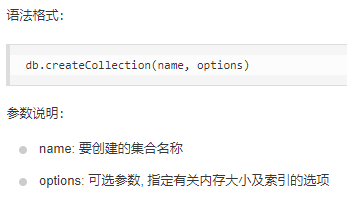目的:使的在IDEA中编辑代码,令代码实现mongodb运算,且转换较为便捷
- 由实验2可知,运算环境的搭建亦需要对数据进行存储和计算,故需要实现类型转换,所以在实验2的基础上搭建环境。
- 由菜鸟教程可得到mongodb命令的具体格式等,如:新建集合

==》可以新建:
case class CreateCollection(name:String,options:Options[Any]=None) //其他的mongodb命令也是照着这样建立的
-
由org.mongodb.scala.model.Filters可知Filters内的相关方法的返回类型都是Bson。例子如下:
/** * Creates a filter that matches all documents where the value of the given field is greater than the specified value. * * @param fieldName the field name * @param value the value * @tparam TItem the value type * @return the filter * @see [[http://docs.mongodb.org/manual/reference/operator/query/gt $gt]] */ def gt[TItem](fieldName: String, value: TItem): Bson = JFilters.gt(fieldName, value) /** * Creates a filter that matches all documents where the value of the given field is less than the specified value. * * @param fieldName the field name * @param value the value * @tparam TItem the value type * @return the filter * @see [[http://docs.mongodb.org/manual/reference/operator/query/lt $lt]] */ def lt[TItem](fieldName: String, value: TItem): Bson = JFilters.lt(fieldName, value)
-
根据相关语法格式,可新建
case class Count(filter: Option[Bson], options: Option[Any])
- 执行相关命令需要引入数据库和集合,新建MGOContext.scala
case class MGOContext(
dbName:String,
collName:String,
action:MGOCommands=null
){ctx=>
def setDbName(name:String):MGOContext=ctx.copy(dbName=name)
def setCollName(name:String):MGOContext=ctx.copy(collName=name)
def setCommand(cmd:MGOCommands):MGOContext=ctx.copy(action=cmd)
}
object MGOContext {
def apply(db:String,coll:String) = new MGOContext(db,coll)
def apply(
db: String,
coll: String,
action: MGOCommands = null
): MGOContext = new MGOContext(db, coll, action)
}
- 分别新建相关的数据库操作,新建MGOCommands.scala和MGOAdmins.scala
//MGOAdmins.scala
import org.bson.conversions.Bson
object MGOAdmins {
case class DropCollection(collName: String) extends MGOCommands
case class CreateCollection(collName: String, options: Option[Any] = None) extends MGOCommands
case class ListCollection(dbName: String) extends MGOCommands
case class CreateView(viewName: String, viewOn: String, pipeline: Seq[Bson], options: Option[Any] = None) extends MGOCommands
case class CreateIndex(key: Bson, options: Option[Any] = None) extends MGOCommands
case class DropIndexByName(indexName: String, options: Option[Any] = None) extends MGOCommands
case class DropIndexByKey(key: Bson, options: Option[Any] = None) extends MGOCommands
case class DropAllIndexes(options: Option[Any] = None) extends MGOCommands
}
//MGOCommands.scala
import org.mongodb.scala.{Document, FindObservable}
import org.mongodb.scala.bson.conversions.Bson
import org.mongodb.scala.model.WriteModel
trait MGOCommands
object MGOCommands {
case class Count(filter: Option[Bson], options: Option[Any]) extends MGOCommands
case class Distict(fieldName: String, filter: Option[Bson]) extends MGOCommands
case class Find[M](filter: Option[Bson] = None,
andThen: Option[FindObservable[Document] => FindObservable[Document]]= None,
converter: Option[Document => M] = None,
firstOnly: Boolean = false) extends MGOCommands
case class Aggregate(pipeLine: Seq[Bson]) extends MGOCommands
case class MapReduce(mapFunction: String, reduceFunction: String) extends MGOCommands
case class Insert(newdocs: Seq[Document], options: Option[Any] = None) extends MGOCommands
case class Delete(filter: Bson, options: Option[Any] = None, onlyOne: Boolean = false) extends MGOCommands
case class Replace(filter: Bson, replacement: Document, options: Option[Any] = None) extends MGOCommands
case class Update(filter: Bson, update: Bson, options: Option[Any] = None, onlyOne: Boolean = false) extends MGOCommands
case class BulkWrite(commands: List[WriteModel[Document]], options: Option[Any] = None) extends MGOCommands
}
- 综上所述,具体实现相关的操作
import org.mongodb.scala.{Document, MongoClient}
import org.mongodb.scala.model.{BulkWriteOptions, CountOptions, CreateCollectionOptions, CreateViewOptions, DeleteOptions, DropIndexOptions, IndexOptions, InsertManyOptions, InsertOneOptions, UpdateOptions}
import scala.concurrent.Future
object MGOEngine{
import MGOAdmins._
import MGOCommands._
def DAO[T](ctx: MGOContext)(implicit client: MongoClient): Future[T] = {
val db = client.getDatabase(ctx.dbName)
val coll = db.getCollection(ctx.collName)
ctx.action match {
case Count(Some(filter), Some(opt)) =>
coll.count(filter, opt.asInstanceOf[CountOptions])
.toFuture().asInstanceOf[Future[T]]
case Count(Some(filter), None) =>
coll.count(filter).toFuture()
.asInstanceOf[Future[T]]
case Count(None, None) =>
coll.count().toFuture()
.asInstanceOf[Future[T]]
/* distinct */
case Distict(field, Some(filter)) =>
coll.distinct(field, filter).toFuture()
.asInstanceOf[Future[T]]
case Distict(field, None) =>
coll.distinct((field)).toFuture()
.asInstanceOf[Future[T]]
/* find */
case Find(None, None, optConv, false) =>
if (optConv == None) coll.find().toFuture().asInstanceOf[Future[T]]
else coll.find().map(optConv.get).toFuture().asInstanceOf[Future[T]]
case Find(None, None, optConv, true) =>
if (optConv == None) coll.find().first().head().asInstanceOf[Future[T]]
else coll.find().first().map(optConv.get).head().asInstanceOf[Future[T]]
case Find(Some(filter), None, optConv, false) =>
if (optConv == None) coll.find(filter).toFuture().asInstanceOf[Future[T]]
else coll.find(filter).map(optConv.get).toFuture().asInstanceOf[Future[T]]
case Find(Some(filter), None, optConv, true) =>
if (optConv == None) coll.find(filter).first().head().asInstanceOf[Future[T]]
else coll.find(filter).first().map(optConv.get).head().asInstanceOf[Future[T]]
case Find(None, Some(next), optConv, _) =>
if (optConv == None) next(coll.find[Document]()).toFuture().asInstanceOf[Future[T]]
else next(coll.find[Document]()).map(optConv.get).toFuture().asInstanceOf[Future[T]]
case Find(Some(filter), Some(next), optConv, _) =>
if (optConv == None) next(coll.find[Document](filter)).toFuture().asInstanceOf[Future[T]]
else next(coll.find[Document](filter)).map(optConv.get).toFuture().asInstanceOf[Future[T]]
/* aggregate */
case Aggregate(pline) => coll.aggregate(pline).toFuture().asInstanceOf[Future[T]]
/* mapReduce */
case MapReduce(mf, rf) => coll.mapReduce(mf, rf).toFuture().asInstanceOf[Future[T]]
/* insert */
case Insert(docs, Some(opt)) =>
if (docs.size > 1) coll.insertMany(docs, opt.asInstanceOf[InsertManyOptions]).toFuture()
.asInstanceOf[Future[T]]
else coll.insertOne(docs.head, opt.asInstanceOf[InsertOneOptions]).toFuture()
.asInstanceOf[Future[T]]
case Insert(docs, None) =>
if (docs.size > 1) coll.insertMany(docs).toFuture().asInstanceOf[Future[T]]
else coll.insertOne(docs.head).toFuture().asInstanceOf[Future[T]]
/* delete */
case Delete(filter, None, onlyOne) =>
if (onlyOne) coll.deleteOne(filter).toFuture().asInstanceOf[Future[T]]
else coll.deleteMany(filter).toFuture().asInstanceOf[Future[T]]
case Delete(filter, Some(opt), onlyOne) =>
if (onlyOne) coll.deleteOne(filter, opt.asInstanceOf[DeleteOptions]).toFuture().asInstanceOf[Future[T]]
else coll.deleteMany(filter, opt.asInstanceOf[DeleteOptions]).toFuture().asInstanceOf[Future[T]]
/* replace */
case Replace(filter, replacement, None) =>
coll.replaceOne(filter, replacement).toFuture().asInstanceOf[Future[T]]
case Replace(filter, replacement, Some(opt)) =>
coll.replaceOne(filter, replacement, opt.asInstanceOf[UpdateOptions]).toFuture().asInstanceOf[Future[T]]
/* update */
case Update(filter, update, None, onlyOne) =>
if (onlyOne) coll.updateOne(filter, update).toFuture().asInstanceOf[Future[T]]
else coll.updateMany(filter, update).toFuture().asInstanceOf[Future[T]]
case Update(filter, update, Some(opt), onlyOne) =>
if (onlyOne) coll.updateOne(filter, update, opt.asInstanceOf[UpdateOptions]).toFuture().asInstanceOf[Future[T]]
else coll.updateMany(filter, update, opt.asInstanceOf[UpdateOptions]).toFuture().asInstanceOf[Future[T]]
/* bulkWrite */
case BulkWrite(commands, None) =>
coll.bulkWrite(commands).toFuture().asInstanceOf[Future[T]]
case BulkWrite(commands, Some(opt)) =>
coll.bulkWrite(commands, opt.asInstanceOf[BulkWriteOptions]).toFuture().asInstanceOf[Future[T]]
/* drop collection */
case DropCollection(collName) =>
val coll = db.getCollection(collName)
coll.drop().toFuture().asInstanceOf[Future[T]]
/* create collection */
case CreateCollection(collName, None) =>
db.createCollection(collName).toFuture().asInstanceOf[Future[T]]
case CreateCollection(collName, Some(opt)) =>
db.createCollection(collName, opt.asInstanceOf[CreateCollectionOptions]).toFuture().asInstanceOf[Future[T]]
/* list collection */
case ListCollection(dbName) =>
client.getDatabase(dbName).listCollections().toFuture().asInstanceOf[Future[T]]
/* create view */
case CreateView(viewName, viewOn, pline, None) =>
db.createView(viewName, viewOn, pline).toFuture().asInstanceOf[Future[T]]
case CreateView(viewName, viewOn, pline, Some(opt)) =>
db.createView(viewName, viewOn, pline, opt.asInstanceOf[CreateViewOptions]).toFuture().asInstanceOf[Future[T]]
/* create index */
case CreateIndex(key, None) =>
coll.createIndex(key).toFuture().asInstanceOf[Future[T]]
case CreateIndex(key, Some(opt)) =>
coll.createIndex(key, opt.asInstanceOf[IndexOptions]).toFuture().asInstanceOf[Future[T]]
/* drop index */
case DropIndexByName(indexName, None) =>
coll.dropIndex(indexName).toFuture().asInstanceOf[Future[T]]
case DropIndexByName(indexName, Some(opt)) =>
coll.dropIndex(indexName, opt.asInstanceOf[DropIndexOptions]).toFuture().asInstanceOf[Future[T]]
case DropIndexByKey(key, None) =>
coll.dropIndex(key).toFuture().asInstanceOf[Future[T]]
case DropIndexByKey(key, Some(opt)) =>
coll.dropIndex(key, opt.asInstanceOf[DropIndexOptions]).toFuture().asInstanceOf[Future[T]]
case DropAllIndexes(None) =>
coll.dropIndexes().toFuture().asInstanceOf[Future[T]]
case DropAllIndexes(Some(opt)) =>
coll.dropIndexes(opt.asInstanceOf[DropIndexOptions]).toFuture().asInstanceOf[Future[T]]
}
}}